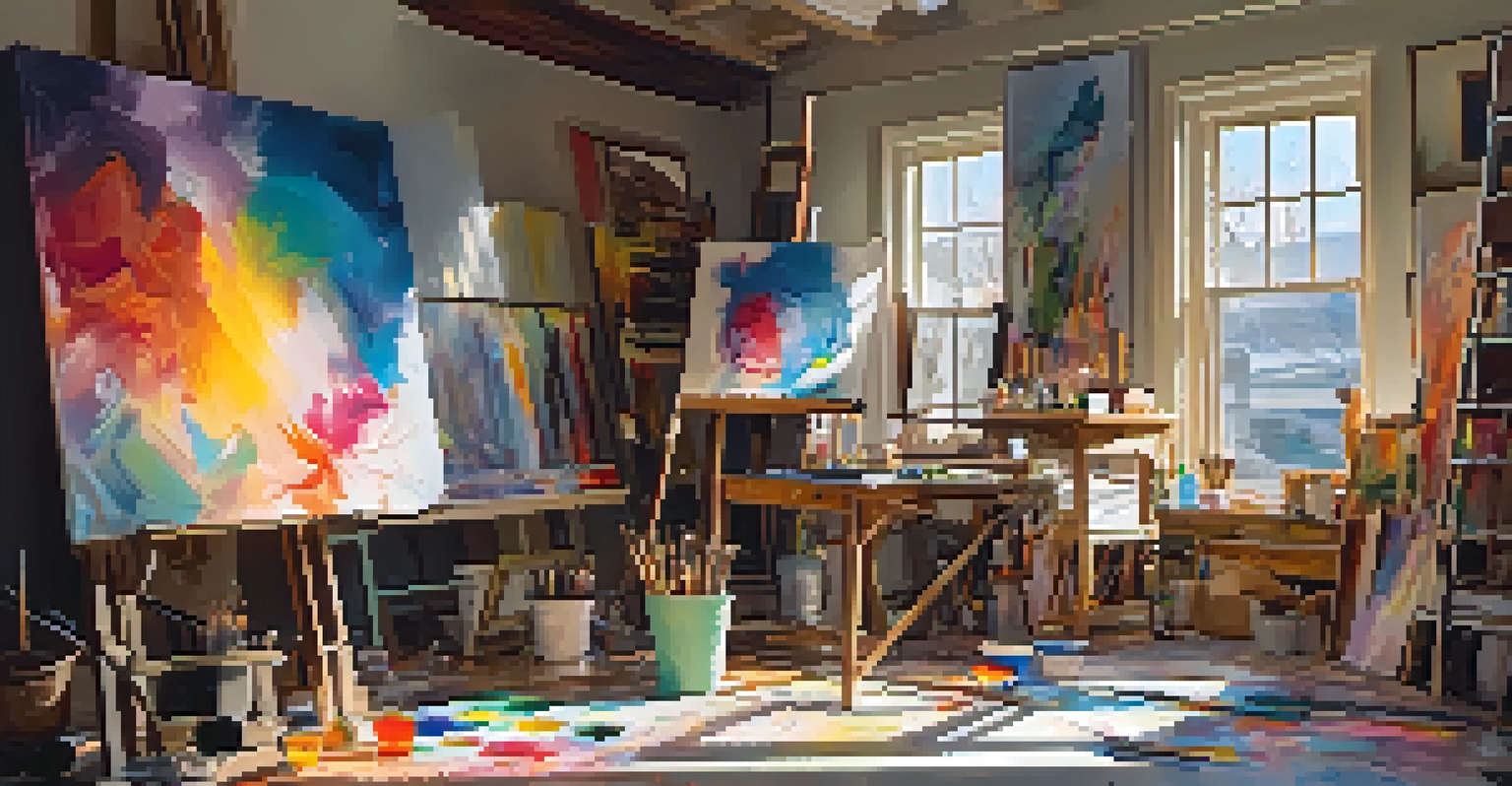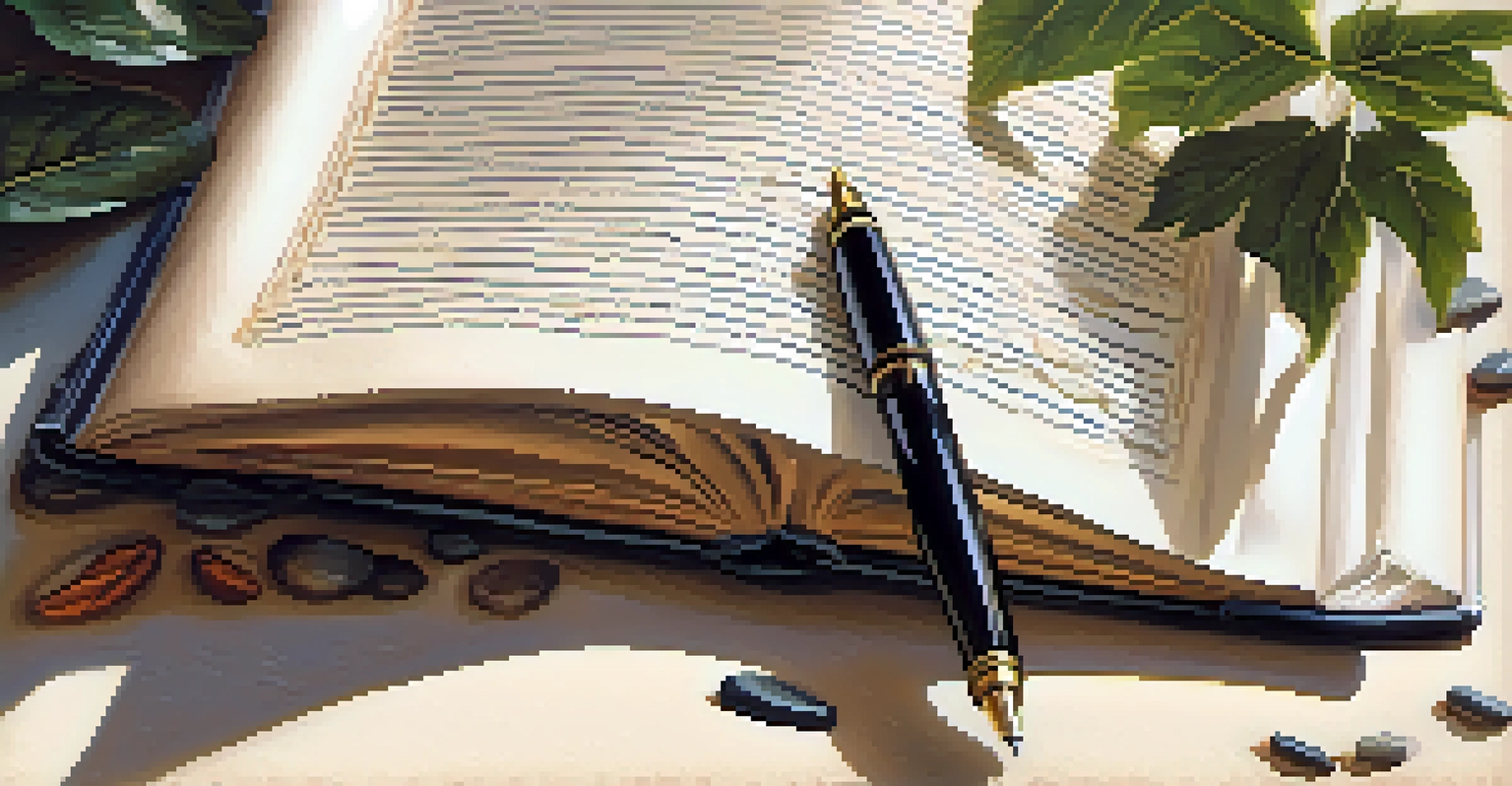The Role of Intuition in Spiritual and Creative Processes

Understanding Intuition: A Guide to Its Essence
Intuition often feels like a gut feeling or an instinct that guides us in decision-making. It's that inner voice that nudges us towards certain choices, even when logic seems to disagree. This innate sense can play a pivotal role in both spiritual and creative endeavors, helping us connect to deeper truths and insights.
Intuition does not contradict rationality, it complements it.
In many cultures, intuition is seen as a bridge to the divine, allowing individuals to tap into wisdom beyond the rational mind. This connection can manifest as inspiration in creative processes, where artists often rely on their instincts to create something unique and impactful. Intuition, therefore, serves as a powerful tool, blending spiritual insight with creative expression.
Recognizing and cultivating intuition can enhance our ability to navigate life's complexities. When we learn to trust our instincts, we open ourselves up to new possibilities and experiences. This journey of understanding intuition can lead not only to personal growth but also to a richer, more authentic creative life.
The Intersection of Intuition and Spirituality
Spirituality encompasses a wide range of beliefs and practices, but intuition often remains a common thread. Many spiritual traditions emphasize the importance of listening to one's inner voice to guide personal development and understanding of the universe. This alignment with intuition can foster a deeper connection to one's spiritual path.

Practices such as meditation, mindfulness, and prayer can enhance our intuitive abilities, allowing us to receive insights more clearly. For instance, during meditation, individuals may find that their intuition becomes sharper, leading to revelations that impact their spiritual journey. This process highlights how intuition can serve as a spiritual compass.
Intuition Enhances Decision-Making
Trusting our intuition can guide us towards more authentic choices in both spiritual and creative endeavors.
Moreover, trusting our intuition can lead to transformative experiences that resonate with our spiritual beliefs. When we act on our instincts, we often find ourselves aligned with our true purpose, helping us navigate the complexities of life with greater ease. This synergy between intuition and spirituality encourages a more profound exploration of our existence.
Intuition: A Catalyst for Creative Expression
In the realm of creativity, intuition acts as a catalyst that fuels artistic expression. Many artists, writers, and musicians rely on their gut feelings to guide their work, often producing pieces that resonate deeply with their audience. This reliance on intuition can lead to innovative ideas that break traditional boundaries.
Your intuition knows what to write, so get out of the way.
For example, consider a painter who begins with a blank canvas. Instead of following a strict plan, they might let their instincts guide their brushstrokes, resulting in a spontaneous and unique masterpiece. This highlights how intuition can lead to unexpected and beautiful outcomes in creative processes.
Embracing intuition in creativity can also alleviate the pressure of perfectionism. When creators trust their instincts, they allow themselves to explore freely without the constraints of self-doubt. This freedom can lead to richer, more authentic artistic expressions that reflect the creator's true self.
How to Cultivate Your Intuitive Abilities
Cultivating intuition involves creating space for self-reflection and awareness in our daily lives. Simple practices like journaling, meditation, or spending time in nature can help us tune into our inner voice. By setting aside time for these activities, we can begin to recognize and trust our intuitive feelings.
Another effective method is to engage in creative activities that allow for free expression. Whether it's painting, writing, or playing music, these pursuits can help us connect with our instincts on a deeper level. As we immerse ourselves in creativity, we learn to listen to our intuition and let it guide our choices.
Cultivating Intuition is Essential
Practices like meditation and journaling help us develop our intuitive abilities, allowing for deeper self-awareness.
Additionally, it's essential to practice mindfulness and stay present in the moment. By being aware of our thoughts and feelings, we can distinguish between genuine intuitive insights and distractions. This clarity can enhance our ability to trust and act on our intuition, leading to greater fulfillment in both spiritual and creative pursuits.
Overcoming Doubts and Fears Around Intuition
Despite its power, many people struggle to trust their intuition due to doubts and fears. These internal barriers can stem from past experiences or societal conditioning that prioritizes logic over instinct. Acknowledging these fears is the first step toward overcoming them and allowing intuition to flourish.
One effective way to combat these doubts is to reflect on past instances where following intuition led to positive outcomes. By recognizing these successes, we can build confidence in our ability to make decisions based on our instincts. This practice reinforces the idea that intuition can be a reliable guide.
Additionally, surrounding ourselves with supportive communities can help alleviate fears surrounding intuition. Engaging with like-minded individuals who value intuition can foster an environment where we feel encouraged to explore our inner voice openly. This support can be crucial in building resilience against self-doubt.
Intuition in Everyday Life: Practical Applications
Integrating intuition into our daily lives can lead to more authentic experiences and decisions. Simple practices like checking in with ourselves before making choices can enhance our connection to our inner voice. This approach encourages us to pause and reflect rather than rushing into decisions based solely on external pressures.
For instance, when faced with a significant life choice, such as a career change, taking a moment to meditate or journal can help clarify our feelings. By tuning into our intuition, we can align our choices with our true desires, leading to more fulfilling outcomes. This intentional practice can transform how we approach decision-making.
Overcoming Doubts is Key
Addressing fears and reflecting on past successes can strengthen our confidence in following our intuition.
Moreover, acknowledging the role of intuition in relationships can enhance our connections with others. Trusting our instincts about people can guide us in forming deeper, more meaningful relationships. This awareness fosters a sense of authenticity in our interactions, allowing us to engage with others genuinely.
The Future of Intuition in Spiritual and Creative Practices
As we continue to navigate an increasingly complex world, the role of intuition in spiritual and creative practices will become even more significant. People are seeking deeper connections and authentic experiences, leading to a resurgence in the appreciation of intuitive guidance. This shift highlights the importance of embracing our inner wisdom.
Moreover, the rise of digital platforms and creative technologies opens new avenues for intuition to flourish. Artists and spiritual practitioners can now share their insights and experiences with a global audience, fostering a collective appreciation for intuition's role in creativity and spirituality. This interconnectedness can inspire more individuals to trust their instincts.

Ultimately, as we embrace the power of intuition, we pave the way for a more authentic and fulfilling future. By recognizing its value in our spiritual and creative journeys, we can cultivate a deeper understanding of ourselves and our place in the world. This holistic approach to intuition will enrich our lives and the lives of those around us.